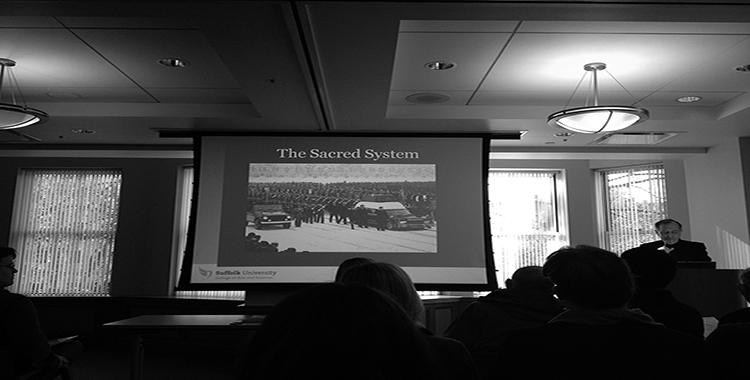This past Thursday at Suffolk University’s poetry center, willing students were offered insight into one of, if not the, most foreign and unseen place in the world. Ambassador Friedrich Lohr, a current visiting scholar at Suffolk and the German Ambassador to North Korea from 2005 to 2007, spoke on the current and future politics of North Korea. In his discussion titled “North Korea: The Father, The Son, The Sacred System,” Lohr did his best, without letting slip any classified information in the most diplomatic of manners, to provide a healthy background into a repressed, and polar-opposite culture and society than what we see in the west.
The discussion began with an introduction to current supreme leader, Kim Jong-un, in a joking light by passing around an article from the comical news cite, The Onion, deeming Jong-un “the sexiest man alive.” This jest played into the current transition of power since Jong-un’s predecessor and father, Kim Jong-il, passed away in 2011. The largest question of late, as Lohr put it, is whether or not he will wield the same power as his father. South Korea, the US, and China have opted for waiting mode to judge the new leader, according to Lohr. The former ambassador expressed himself that “[Kim Jong-un] is still immature, but his intellect is not as low as people have surmised.”
Much of Lohr’s discussion revolved around the funeral ceremony for Jong-un’s predecessor and how meticulously it was carried out. A long description of specifically who was present and in what order they stood in relation to the supreme leader, acting as indications to the future military and political posts to be assigned. The people, military, and the party were illustrated through out the talk as harmonious, citing speeches given at the funeral. This displayed how the Democratic People’s Republic of Korea (DPRK) would not be significantly altering in any way.
Some of his own on-the-ground experience was bestowed upon attendees throughout his talk. When Lohr was asked what the toughest part of his job was, he said, “terrible traffic jams.” This, of course, was a joke considering the unrepresentative wealth dispersion in the DPRK. He commented on how more and more cars were being bought, namely from Germany and South Korea, but this is still a sign of power and wealth that most of the population hasn’t the chance to conceptualize. The average citizen of the DPRK lives on a strict regimen of time and action since there are informers all over the streets and also assigned to living groups of more than five. The “simple, but tidy” Koreans live under consistent apprehension from a higher authority, but make due nonetheless.
The conclusions Lohr drew from the transition of power and international claims of “fresh wind” blowing through North Korea, were causally, but definitely refuted. In the name of regime preservation, high discipline, and international presence, the DPRK does not seem to be hastily embracing the international community any more than it has in the past. “The DPRK does not want and cannot be an eternal enemy of the United States, but they want to meet them at the same height,” Lohr stated in representation of their future ventures. Be it the safeguarding of their nuclear weapons or “unpredictable precision,” Lohr said.
Both acceptance by and embrace of a more open and international future is sadly mistaken. Although a few luxuries may be spared by the regime for those able to flaunt it, the overall grip the regime has on society will not be slipping. Lohr, in a very articulate and all-encompassing fashion, captured what he could of the current situation in the DPRK regardless of how hopeful he may not have been.













